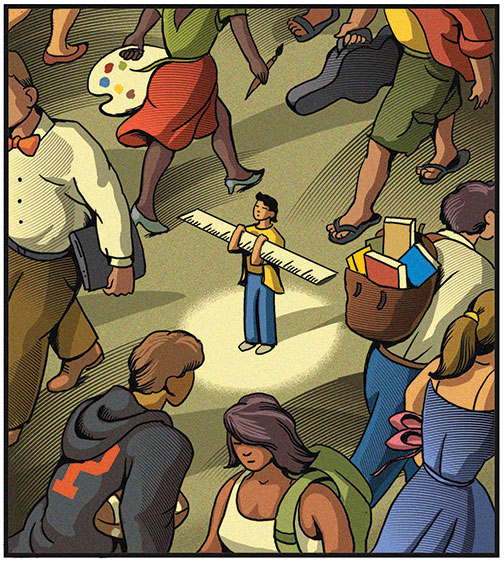Essay: Escaping My Secret Cave of Despair: A Look Back at the Burden of Perfection
A Look Back at the Burden of Perfection
By the outward standards of Princeton success, sophomore year was my golden year. I bickered an eating club, got into Woody Woo, and briefly dated one of the more attractive human beings I will ever briefly date.
Sophomore year was also the year, however, in which I buried my dorm room in a blizzard of filth. Drifts of printer paper and dirty laundry covered the floor of my Whitman single for the better part of two semesters. It was as if the stress-storm I’d been struggling against all year had torn through Lauritzen Hall.
On the outside I seemed fine, but then, most Princetonians do. At Princeton it’s easy to believe that everyone around you is coasting by on superior intelligence and charm — and that any struggles you face are therefore social aberrations, best kept hidden if you want to fit in. Eventually a fire inspector wrote me up for “unsafe and unsanitary” living quarters. I could quibble with the latter judgment — there was no rotting food on the floor, which ought to count for something — but not with the unsafety of it all. Slowly, I cleaned up my act.
I thought about that secret cave of despair when I started reading up on the myth of “effortless perfection.” In November, the administration and the Undergraduate Student Government launched a campaign to fight unrealistic expectations around success and struggle. According to the Princeton Perspective Project, these expectations cause “students to feel alone and inadequate in their academic, social, or emotional struggles while believing that everyone else has it together. This illusion becomes the standard to which we hold ourselves, while we avoid reaching out for support and understanding because of the fear of revealing our weaknesses and shortcomings.”
That’s as good an explanation as I’ve seen concerning the burden of “effortless perfection,” although I’d add that this burden doesn’t fall on all Tigers equally. As a USG leader explained to me, certain groups of Princetonians — students from low-income families, first-generation college students, recruited athletes — are especially vulnerable to feeling less worthy than their supposedly “perfect” classmates. Female students, meanwhile, not only have to achieve excellence in academics and extracurriculars, but must seem perky and put-together while doing so.
The goal of the Perspective Project is to help students learn healthy standards of success (the initiative’s first phase, a series of video testimonials from students about their struggles, is well worth checking out). I hope they get there. Lowering the temperature on effortless perfection won’t just make students’ lives easier at Princeton. It’ll also smooth their passage into the real world.
If anything, the Princeton perfection myth only grows stronger once you graduate from college. As years pass and Princetonians drift apart, you see your classmates only as they want to be seen — on curated Facebook and Instagram feeds, in the pages of PAW. (I wish we lived in a string-theory alternate universe where Class Notes included such trivialities as “Nadiya ’12 recently began her fourth rewatch of Orange Is the New Black; her former carrelmate Andrew ’12 assembled an IKEA Micke desk with optional integrated storage.” But this is not that universe, reader, so let me instead be the first to congratulate you on your wedding / engagement / new book / seventh grandchild!)
I recently went back to Princeton to see my friend Rachel, a classmate who still lives in town. We met on Nassau Street and I told her about this essay. Rachel told me about her work, which often sends her abroad to interview government officials. To outward appearances, Rachel’s life is enviable — glamorous, even. But in truth, she said, the gig is pretty tough. On most trips, the only people she knows are the officials she’s interviewing. It can get lonely.
I pointed out, as consolation, that Rachel’s Facebook photos are the envy of all who know her. (She appears to spend most of her time overseas ambling though sun-dappled plazas.) Rachel feels a little guilty about that: On the one hand, photography gives her a creative outlet on the road; on the other hand, by posting the photos for all to see and “like,” she says, “I also know I’m just perpetuating the myth.”
The core problem with this perfection myth is how it tricks you into comparing the high points of other people’s lives against the mundanities of your own. The solution is probably to stop measuring yourself against other people altogether, but of course that’s easier said than done. I only made progress on that score in the past year or so, after moving to a small island off Hong Kong to live with some friends and a gaggle of rescue animals. There were no cars on the island, only walking trails. I freelanced enough to cover rent, but mostly I read and hiked and acclimatized to my lack of traditional success.
I lived there for a year. It was lovely. However: In the interest of combating effortless perfection, let me also say that it rained a lot and that one of our rescue dogs, a Shih Tzu named Debbie, was cranky and incontinent. Let me acknowledge that I was frequently bored even as I tell you that it was the best year of my life; let it be known that my bedroom was cramped and uncozy, even though I kept it spotlessly clean.
David Walter ’11 recently moved to New York from Hong Kong. He has written for PAW since his sophomore year in college.













No responses yet